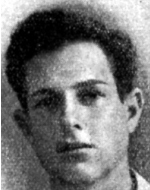Glass, Raphael (Rafi)
Son of Shoshana and Shimon Moshe, was born on the 6th of Cheshvan 5661 (6.11.1930) in Rishon Letzion. He grew up in Tel Aviv and studied in the Talmud Torah of the ultra-Orthodox Histadrut and later in Yeshivat HaYeshuv HaChadash. He was a member of Bnei Akiva, of the religious sports association Elitzur and of the Elitzur Guards. At the age of 16, he asked his older brother to bring him into the ranks of the Haganah and to explain to his brother that he was not influenced by propaganda and lobbying. Despite his young age, the activity in the Gadna was considered a children’s game and his repeated demands were transferred to the Haganah, and he became equal to the adults in the burden of responsibility and the difficulties of the missions. The internal front of the struggle, the affixing of flyers, the waiting in hospitals, the maintenance of installations, etc. In the joy of the United Nations General Assembly resolution on partition, he stood up to defend the Yishuv and was among the first to defend the Hatikva neighborhood. Raphael was one of the first to enter Sarona after the British left her. He served in the religious company of his battalion in the Givati Brigade and participated in escorting convoys to Haifa and Jerusalem. In the role of Regam, he was sent to the defenders of Bat Yam, and in the end he was sent among the fighters’ fighters to defend besieged son of Shemen. He replied that if the Yishuv did not want to reach the fate of the Jews of the ghettos, every young man must defend and forget his age, and anyone who knew how to take up arms and understood the necessity of doing so would be sentenced to twenty years of age. He used to erase the day from the calendar every evening, and when asked why he did so, he replied: Every day he brings us closer to the country. Rafael was injured in an accident at son of Shemen and flown to a hospital. Two days later, on the 3rd of Adar 5748 (April 3, 1948), he died of his wounds and was brought to rest in the Nachlat Yitzhak military cemetery.
